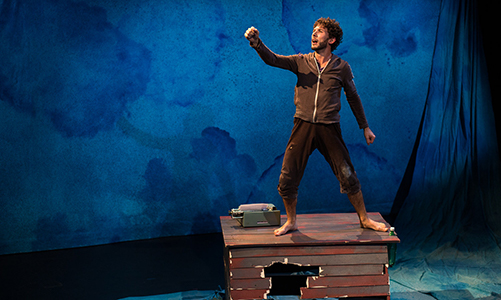Community, Leadership, Experimentation, Diversity, & Education
Pittsburgh Arts, Regional Theatre, New Work, Producing, Copyright, Labor Unions,
New Products, Coping Skills, J-O-Bs...
Theatre industry news, University & School of Drama Announcements, plus occasional course support for
Carnegie Mellon School of Drama Faculty, Staff, Students, and Alumni.
CMU School of Drama
Thursday, March 28, 2019
Climate Change Theatre is LIT.
HowlRound Theatre Commons: Like many of us, I’ve spent a lot of time feeling disturbed, depressed, and defeated as the climate crisis grows. I’ve done a lot of soul searching to understand how I can transform my despair into something meaningful. Having long been fascinated and compelled by the power of art to command attention and inspire people to care about things, I wanted to study how this power could be wielded to encourage people to care about and act upon climate change. As a graduate student, I attempted to do just that. Ironically, the most significant thing I learned is that the true power of art isn’t something that one “wields” at all.
Subscribe to:
Post Comments (Atom)

3 comments:
Having seen climate change theater whose very clear intent was to tell us as the audience what we should be doing and how we should change, I agree that a prescriptive piece becomes less powerful. It definitely is partly due to the fact that humans are resistive to being told what to do and resistive to feeling as though they are in the wrong. However, I think it also has to do with the fact that a lot of “should” and “ought” statements leave off the why part. People are far more receptive when they understand why they should be making changes and if they also grasp how to make those changes. I also believe that one of the biggest issues with climate change art is that is so often tends to be dystopian or futuristic or apocalyptic, which only serves to widen the disconnection between climate change and our present era.
I often find it difficult to respect climate change theatre in particular. The art is either too extreme for an audience or the perspective of the piece is so far skewed that it isn’t enjoyable to watch. Art makers need to understand that they are essentially attacking the audience given that a large amount of the climate change problem is related to humankind. People inherently do not like being told that they are wrong.
In my personal opinion, I believe theatre that involves climate change is very good at listing the problems occurring in the environment, but when it comes to suggesting viable solutions, it falls short. I get the impression that current audiences aren’t looking for a soapbox preach. Overall, the most potent and effective solution to climate change is to bring people to realize the problem while simultaneously commenting on how the situations can be improved.
Climate change is a really difficult concept to introduce to theatre without it feeling like a grade school performance that lists off facts, lists, and figures. Part of where I feel Climate Change Theatre begins to weaken is providing an audience with realistic goals and solutions that they feel empowered to take away and implement into their own lives. I make a point to expose myself to articles, documentaries, and art pieces that are inspired by climate change, but sometimes I find it really difficult to encourage myself to do so because many of these pieces end in quite a hopeless state. A lot of the time you are force fed repetitive facts and figures about the dire situation that we are in, which is effective up to a point, but, personally, I find myself significantly more activated to make personal changes when I feel hope. I think Climate Change theatre, especially when it is emotionally engaging such as the piece written about here, has a chance to become something really impactful with time.
Post a Comment